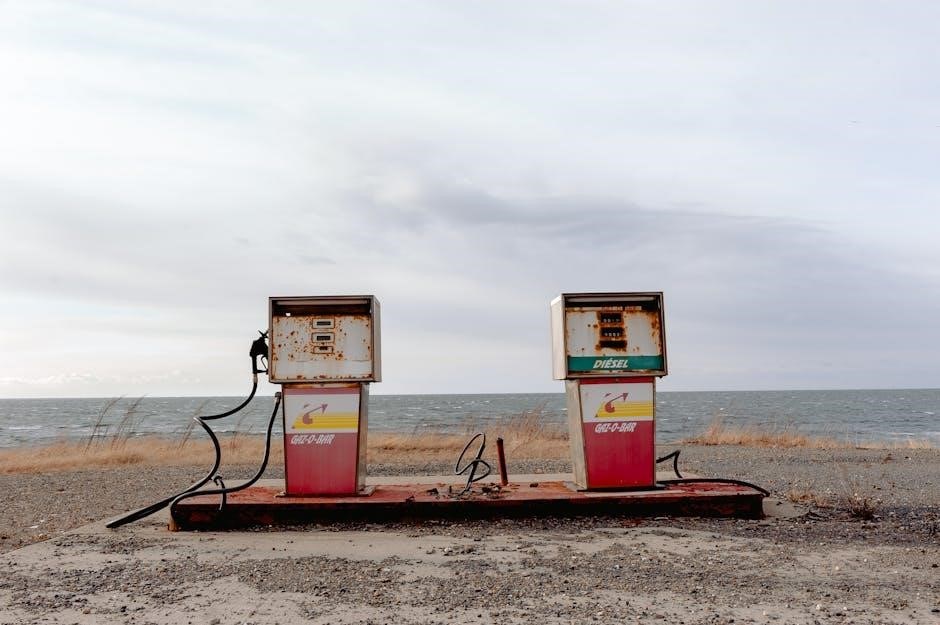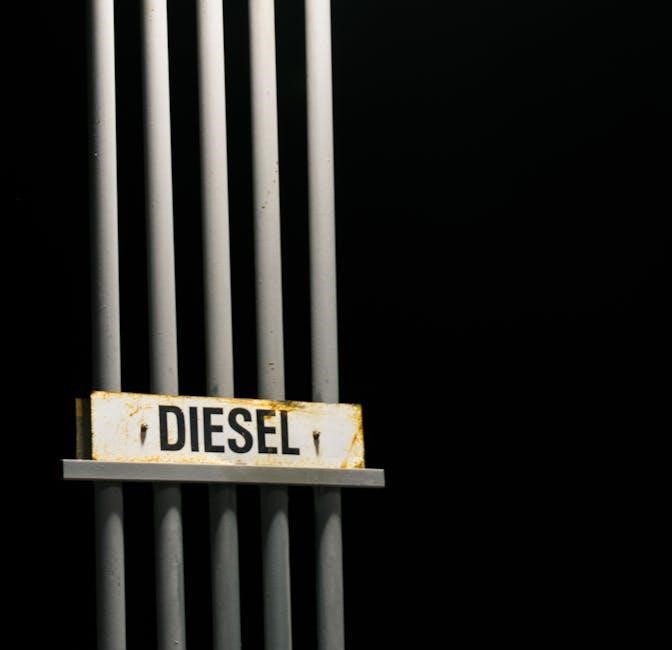Diesel 911 is a trusted emergency solution for diesel engines, designed to restore fuel flow when gelling or freezing occurs. It prevents engine shutdowns in cold climates.
What is Diesel 911?

Diesel 911 is a premium emergency additive designed to restore diesel fuel flow in cold weather conditions. It prevents fuel gelling and thaws frozen fuel filters, ensuring engine operation. Trusted for decades, it works quickly to liquefy gelled fuel and clear ice crystals, maintaining fuel system performance. Safe for all diesel engines, it’s a reliable solution for drivers facing winter fuel issues. Its effectiveness in extreme climates makes it a must-have for diesel vehicle owners seeking uninterrupted performance during cold snaps.
Importance of Diesel 911 in Cold Climates
Diesel 911 is crucial in cold climates as it prevents fuel gelling, a common issue causing engine failure. By liquefying gelled fuel and de-icing filters, it ensures continuous operation. This prevents costly repairs and downtime, especially for vehicles in remote areas. Its effectiveness in extreme conditions makes it a vital tool for drivers relying on diesel engines during harsh winters. Regular use can safeguard against winterization, ensuring fuel systems remain functional and vehicles stay operational in freezing temperatures.

Key Components of Diesel 911
Diesel 911 contains specialized additives that prevent fuel gelling and de-ice filters, ensuring smooth engine operation in freezing temperatures. Its fast-acting formula restores fuel flow effectively.
How Diesel 911 Works

Diesel 911 works by dissolving gelled diesel fuel and de-icing frozen fuel filters. When added to the tank, it lowers the fuel’s gel point, allowing it to flow freely. The formula breaks down wax crystals and disperses moisture, ensuring proper fuel circulation. It acts quickly, typically within minutes, to restore engine operation. This emergency solution is designed to address cold-weather fuel issues effectively, getting diesel engines running smoothly in extreme conditions without causing harm to the fuel system or engine components.
Active Ingredients and Their Roles
Diesel 911 contains specialized additives that target gelled fuel and frozen components. Its primary ingredient is a wax crystal modifier, which prevents diesel fuel from gelling in cold temperatures. Another key component is a de-icing agent that thaws frozen fuel lines and filters. Additionally, it includes a moisture dispersant to eliminate water contamination, ensuring fuel stays dry and free-flowing. These active ingredients work synergistically to restore fuel flow, prevent engine shutdowns, and maintain optimal performance in extreme cold conditions. Their combined action makes Diesel 911 highly effective for emergency winter situations.

Step-by-Step Application Instructions

Add Diesel 911 directly to the fuel tank, treating the full capacity. Turn the engine on and let it idle briefly to circulate the additive through the system.
Preparing Your Vehicle for Diesel 911 Treatment
Before using Diesel 911, ensure your vehicle is parked on a level surface and the engine is cool. Locate the fuel tank and remove the cap. Wear protective gloves and eyewear to prevent exposure. If the fuel filter is clogged, remove and replace it before adding the product. Ensure no heat sources are nearby to avoid ignition risks. Proper preparation ensures the product works effectively and safely. Always refer to the manufacturer’s guidelines for specific instructions.
Adding Diesel 911 to the Fuel Tank
When adding Diesel 911, start by filling the tank if the fuel level is low. Pour the recommended dose directly into the tank, ensuring the cap is removed. The product is designed to mix with the fuel, so no stirring is needed. Replace the fuel cap securely after application. Allow the engine to run for a few minutes to circulate the treated fuel. Avoid overfilling the tank, as this can cause spills. For severe gelling, multiple doses may be required in extreme cold conditions. Always follow the product’s instructions for proper usage.
Allowing the Product to Work
After adding Diesel 911, allow the product to work by letting the vehicle sit for 10-15 minutes. This enables the additive to dissolve gelled fuel and restore flow; Start the engine at a low idle to circulate the treated fuel through the system. Avoid driving immediately to ensure the product fully addresses any remaining issues. If the engine stalls or runs rough, repeat the process as needed. Monitor performance to confirm the fuel system is clear and functioning properly. This step is crucial for ensuring the product effectively resolves gelling issues.

Safety Precautions When Using Diesel 911
When using Diesel 911, wear protective gloves and eyewear. Ensure good ventilation to avoid inhaling fumes. In case of exposure, rinse with water and seek medical attention if necessary.
Protective Gear and Ventilation
When handling Diesel 911, wear protective gloves and eyewear to prevent skin and eye irritation. Work in a well-ventilated area to avoid inhaling fumes. If used in an enclosed space, ensure proper airflow. Avoid breathing in vapors, as they may cause respiratory discomfort. Proper ventilation reduces the risk of exposure, ensuring a safer application process. Always prioritize personal safety to handle the product effectively and responsibly.
Emergency Procedures in Case of Exposure
In case of Diesel 911 exposure, immediately flush affected areas with water. For skin contact, wash thoroughly with soap and water. If it gets into the eyes, rinse with clean water for at least 15 minutes. Remove contaminated clothing and wash before reuse. Seek medical attention if irritation persists. If ingested, do not induce vomiting; call a poison control center or doctor immediately. Keep the product away from children and pets. Emergency procedures ensure prompt action to minimize potential harm from accidental exposure.

Troubleshooting Common Issues
Common issues with Diesel 911 include gelled fuel not fully resolving, often due to insufficient treatment or not replacing frozen filters. Check application procedures and ensure proper dosing for effective results.
Why Diesel 911 May Not Work
Diesel 911 may fail to resolve gelled fuel if not applied correctly. Insufficient dosage or delayed treatment can prevent proper dissolving of wax crystals. Extreme cold beyond product limits can also reduce effectiveness. Additionally, clogged fuel filters or existing gelled fuel in lines or tanks can hinder its action. Ensure proper application, check temperature compatibility, and address any system blockages for optimal results.
Resolving Gelled Fuel in Extreme Conditions
In extreme cold, gelled fuel can render your diesel engine inoperable. Diesel 911 is designed to address this by dissolving wax crystals and restoring fuel flow; For severe cases, ensure the product is added directly to the fuel tank before symptoms arise. If fuel has already gelled, allow the vehicle to warm up in a sheltered location or use a block heater. Combining Diesel 911 with proper winterization practices ensures optimal performance and minimizes downtime in freezing temperatures. Always follow the manufacturer’s instructions for best results.

Preventative Measures
Regular fuel system maintenance and using preventative additives like Diesel 911 can help avoid gelling issues. These steps ensure smooth engine operation, especially in cold climates.
Regular Fuel System Maintenance
Regular fuel system maintenance is crucial to prevent issues like gelled fuel. This includes changing fuel filters, inspecting fuel tanks for moisture, and ensuring proper fuel flow. Using additives like Diesel 911 can help maintain fuel quality and prevent winterization. Routine checks on fuel lines and pumps ensure optimal performance. Addressing these areas proactively reduces the risk of engine shutdowns in cold conditions. By maintaining your fuel system, you can rely on your diesel engine to perform consistently, even in extreme weather. Regular maintenance is key to avoiding costly repairs and downtime.
Using Preventative Additives
Preventative additives like Diesel 911 play a crucial role in maintaining fuel system health. These products are designed to prevent gelling and freezing of diesel fuel in cold temperatures. By addressing water contamination and fuel degradation, they ensure smooth engine operation. Regular use of such additives helps maintain fuel flow, protects fuel lines, and prevents costly repairs. They are especially effective when used before extreme weather conditions. Incorporating preventative additives into your maintenance routine is a proactive way to safeguard your diesel engine’s performance and reliability year-round.
Diesel 911 is a reliable solution for gelled fuel issues, ensuring engine performance in cold climates. Regular use can prevent winterization and maintain fuel system health effectively.
Final Thoughts on Using Diesel 911
Diesel 911 is a reliable and effective solution for diesel fuel issues in cold climates. It quickly restores fuel flow and prevents engine shutdowns caused by gelled fuel. Regular use as part of preventative maintenance can extend the life of your fuel system. Always follow the instructions carefully and take safety precautions to ensure safe handling. By incorporating Diesel 911 into your winter routine, you can confidently tackle freezing temperatures and keep your engine running smoothly. It’s a trusted tool for diesel owners facing harsh winter conditions.
Recommended Resources for Further Reading
For deeper understanding, explore the official manufacturer’s guide and safety data sheet for Diesel 911. Visit trusted automotive websites like DieselTech and TruckersGuide for real-world applications and testimonials. Additionally, consult cold-weather driving tips from automotive experts to enhance your winter driving preparedness. These resources provide comprehensive insights into diesel fuel maintenance and emergency solutions, ensuring you’re well-equipped to handle extreme conditions effectively.

Leave a Reply
You must be logged in to post a comment.